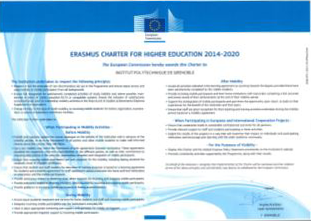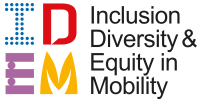
the European Commission under the new Erasmus+ programme for the period 2021-2027.
By signing the Erasmus + charter in April 2021, Grenoble INP - UGA
has undertaken to publish its international Erasmus strategy, detailed in the following document
Consult the Erasmus+ strategy (in french)
Erasmus Code : FGRENOBL22
Promoting international student and staff mobility through the Erasmus+ program
Grenoble INP - UGA puts internationalization at the heart of its strategy and has, in this context, signed partnership agreements with 207 European institutions.
Between 2015 and 2021, the institution has offered to 2051 students the opportunity to go on a mobility program in one of these institutions ( which represents 76% of the student mobilities during this period) and has welcomed 1030 students.
Within the framework of the Erasmus+ program, it is also possible for staff members to go on mobility in order to teach or train in an international context. To find out more about mobility opportunities for staff, visit our dedicated page.
Ongoing Erasmus+ projects at Grenoble INP - UGA
Key Action 1 : Learning Mobility for Individuals
- Mobility project for higher education students and staff
-
This key action supports students, interns, teachers, and staff members to take part in an academic, professional or apprenticeship experience in another country.
This key action thus enables Grenoble INP to finance and accompany each year, several hundreds of mobilities for students and staff, in participating and partner countries.
Grenoble INP - UGA therefore commits to following the quality criteria defined by the European Commission in the Erasmus+ Charter before, during and after the mobility. - Erasmus+ International Credit Mobility
-
An Erasmus+ International Credit Mobility Project is a call for projects, created in 2015. It has a dual purpose: to promote exchanges of students and academic staff by providing mobility grants and that of developing partnerships between Grenoble INP - UGA and the countries of the Erasmus+ program and its partner countries.
In this framework, Grenoble INP - UGA applies for projects with some countries such as Vietnam, Cameroon, Tunisia, Morocco and Armenia.
In 2019, Grenoble INP - UGA becamea laureate of a project with Armenia and Tunisia. This ongoing project will run for 3 years: 2019-2020; 2020-2021 and 2021-2022.
Our partners in this project are :
Armenia : National Polytechnic University of Armenia (NPUA), Yerevan State University
Tunisia : The Ecole nationale supérieure d'ingénieurs de Tunis (ENSIT), Ecole Nationale d'Ingénieurs de Tunis (ENIT), Ecole Nationale d'Ingénieurs de Sousse (ENISO), Ecole nationale d'ingénieurs de Monastir (ENIM), Ecole Supérieure des Communications de Tunis (SUPCOM)
Previous projects:
Erasmus+ International Credit Mobility Project 2018 (2018-1-FR01-KA107-047620): Armenia, Morocco and Tunisia. Read more
Key Action 2 : Cooperation among organisations and institutions
Capacity building
- ASICIAO
-
The Erasmus+ project ASICIAO whose main coordinator is the University of Technology of Troyes aims to encourage cooperation with partners from Senegal and Togo. Four European institutions will accompany six institutions in Senegal and Togo in order to offer engineering diplomas that are in accordance both with these countries' specific socio-economical needs and with international standards (specifically CTI and EUR-ACE).
Within this framework and throughout the entire project, Grenoble INP is undertaking to host and train the professors, directors of academic programs and heads of education from the African partner universities.
Key Informations:
European Institutions involved : Université de Technologie de Troyes (UTT), Université Catholique de Louvain (UCL), Technical University Sofia (TUS), Grenoble INP - UGA African Institutions involved : École nationale supérieure d'ingénieurs (ENSI) and the Centre informatique et de calcul (CIC), of l'Université de Lomé (UL), Université Catholique de l’Afrique de l’Ouest - Unité Universitaire au Togo (UUT-UCAO), l'Institut Des Nouvelles Technologies Appliquées (CIB-INTA), l’École Supérieure Polytechnique (ESP) de l'Université Cheikh Anta Diop De Dakar (UCAD), l’École Polytechnique De Thiès (EPT), l'Institut Polytechnique de Saint-Louis (IPSL) de l'Université Gaston Berger (UGB) and l’Université Virtuelle Du Senegal (UVS) Erasmus+ grant : approx. 1 Million Euros Project Duration : 2019 - 2023
Press Review (in French):
March 2023 : Une semaine au Sénégal pour le projet ASICIAO
July 2022 : Coopération avec l'Afrique : deux délégations accueillies
November 2021 : ASICIAO - Une semaine de collaboration au Togo
Contact : Rita Pereira - ESSENCE
-
Le projet ESSENCE (Establishing Smart Energy Curriculum at Vietnamese and Russian Universities) vise à aider les universités russes et vietnamiennes à adapter leur cursus de master d’ingénierie en SEI afin de répondre aux exigences de l’évolution technologique.
Ce projet est mis en œuvre en étroite coopération avec le secteur industriel et conformément au cadre européen de certification. De nouveaux parcours de formation seront développés basés sur les atouts de chaque membre du consortium, en tirant profit de l’expérience européenne de création de programmes pédagogiques, en accord avec le processus de Bologne. Dans le cadre de ce projet, un tronc commun sera élaboré afin d’être intégré dans différents programmes de masters existants, et mis en place au cours de l’année 2020.
- IDEM - Inclusion, Diversity, Equity in Mobility
-
“IDEM - Inclusion, Diversity, Equity in Mobility” focuses on students with disabilities, learning difficulties and structural disadvantages (i.e. students with fewer opportunities / underrepresented. These students are underrepresented in conventional physical mobility programs, such as Erasmus+, and face significant challenges when participating in Erasmus exchanges.
The long-term objective of IDEM is to increase the number of students with fewer opportunities taking part in mobility programs while at the same time anchoring the values of Diversity and Inclusion in the strategic mission of each partner university.
IDEM will have an impact on both these students and partner universities by piloting, testing and recommending a mobility model that will ensure chances of equitable participation in exchange programs for all students.
The Training will impact the way university staff perceive disabilities, difficulties and disadvantages among student populations and will offer tools to address their needs regarding mobility. Through the Bootcamps, IDEM will promote discussions and reflections on Diversity, Inclusion and Equity within the European Higher Education System.
Key information:
Contact : Lucie Jiraskova et Guillaume Thomann
Project Duration: 3 years from February 2022
Budget: 360 000 €
Coordinator : TU Darmstadt
Partner Universities: Grenoble INP – UGA, Aalto University, Universitat Politecnica de Catalunya, Universidade de Lisboa, TU Darmstadt
- FAME+
-
FAME+ (Functional Advanced Materials Engineering) is an international Master coordinated by Grenoble INP – UGA. The fast evolution of the field of Nanomaterials and Functional Materials Sciences requires a strong consortium with recognised educational experience in the field, close links between education and research, and awareness of industrial evolutions. These needs are met in the FAME+ master programme by the integration of academic excellence of the partners, of their involvement into advanced research networks, and of their links to key industrial players in the field.
- Unite!
-
Unite! aims to create a transeuropean campus, ranging from Finland to Portugal. Unite! strives to innovate both in the education of engineers and in the development of a european citizenship.
In November 2022, Unite! has received a funding boost of 14M€ from the European Commission.
The Alliance unites nine technical universities renowned for the outstanding quality of their training and research: TU Darmstadt (Germany), Aalto University (Finland), the KTH Royal Institute of Technology (Sweden), the Grenoble Institute of Technology (France), the Polytechnic University of Turin (Italy), the Polytechnic University of Catalonia (Spain) and the University of Lisbon (Portugal), Graz University of Technology (Austria), Wroclaw University of Science and Technology (Poland).
- AVATAR
-
This project led by Grenoble INP - UGA, in the School of Industrial Engineering, is clearly in line with the initiative of the European Commission aimed at the development of digitization (Digitizing European Industry initiative) in order to enhance Europe’s competitiveness in the field of digital technologies.
The partners are Politecnico of Milan (Polimi), the University of Belgrade, the most important in Serbia and the National Research Council of Rome (CNR-STIMA), which is not a higher education institution but a promoter of the industrial innovation with a wide experience in collaborations with industrial and academic partners.
AVATAR (Advanced Virtual and Augmented Reality Toolkit for Learning) is a project funded by the Erasmus + program which lasts from September 2020 to August 2023.
The main objective of this project is to support and facilitate the adoption of Virtual Reality and Augmented Reality (VR / AR) technologies in engineering curricula.
To achieve the objectives of this project a set of workflows will be developed, describing and formalizing how to implement learning activities in engineering taking advantage of VR/AR tools.
Three joint learning periods are planned, leading to a "Joint Learning Lab" organized annually in one of the partner universities; each one concerns about fifteen Master students who will work together in the common fields of engineering and will be implemented as follows:
Learning approaches for experiencing/developing VR/AR technologies to support the use and implementation of AR/VR tools (e.g., how to build a 3D scene for VR, how to prepare and organize contents for VR/AR, how to address interactivity in VR/AR).
Learning approaches using AR/VR within integrated engineering approaches to provide a better and deeper understanding of engineering problems (e.g., in the design of a manufacturing system and/or in the definition of detailed trajectories in robotized assembly processes).
AR/VR as an innovative environment for learning assessment addressing address how to implement assessment tools (exercises, quizzes, polls, etc.) within VR/AR environments.










